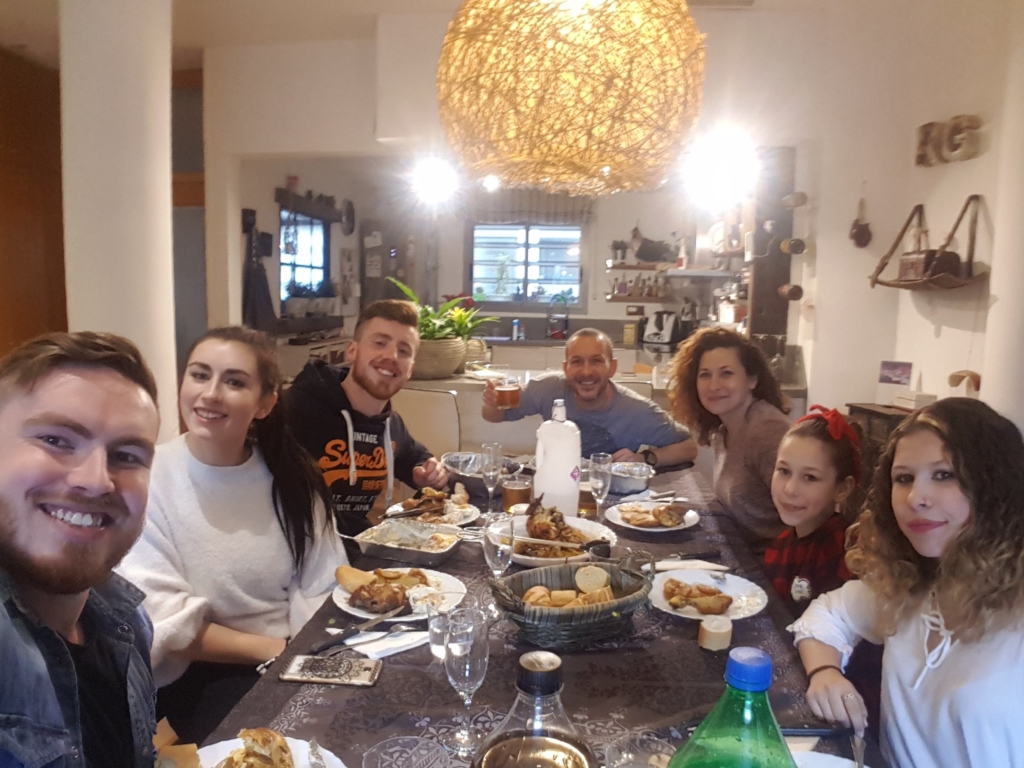Isabelle is back to share her tips and tricks to get off to the perfect start to your Spain internship. This will put your traveling nerves at ease, so you can enjoy the experience.
What to Expect on Arrival?
OMG, you’re in SPAIN! Let’s get this fiesta started. When you arrive in Barcelona, you’ll be greeted and picked up from the airport by a member of the in-country team. From the airport, you and fellow interns will take a bus to a hotel just outside the city where the orientation takes place. Once there, you’ll meet some of the local team to check-in, get important paperwork, and drop off your suitcases.
Eat a quick lunch with your new amigos before the presentations and activities start. Because you’ll meet your host family the next afternoon, the entire orientation weekend is a whirlwind experience. In just a day and a half, there’s a lot to take in and learn in a short amount of time. Don’t feel pressure to remember everything—you can always reach out to your fellow interns, your tutor, or your host family with any questions or issues.
Top Tip #1: Don’t forget to bring physical copies of ALL of your documents with you to Spain. You’ll need your letter of acceptance, copies of your passport, your official background check (with translation), and copies of your visa.
Top Tip #2: As you’re preparing and packing for Spain, you’ll want to bring a little weekend bag or backpack to have for shorter trips during your internship. Consider using that little weekend bag as one of your carry-ons and pack a couple of outfits, toiletries, and whatever you’ll need for those two nights of orientation. It will be SO much easier to have this handy rather than opening up your suitcases to dig for things and then having to repack everything right before leaving again.

Making the Most of Your Orientation Experience
You’ll be at orientation with nearly 300 other teaching interns from all over the world—that’s a LOT of new friends! While it’s fantastic to meet people from everywhere, it can also be exhausting! Keep in mind that you’ll have plenty of opportunities to connect with everyone throughout the year. Befriend others now, but don’t be afraid to take time for yourself, too.
Some of the games/activities/icebreaker activities can be helpful in the classroom. The ones that are the most active and involve a lot of competition are especially useful as you’ll most likely be working with groups of energetic students!
The legalization process is a lengthy one, and your tutor and host family may not know too much about it. But don’t worry! We have written out a helpful guide to legalization for you. Once you’re settled, see if your tutor or a host family member can come with you to your social security number appointment and assist you in setting up your bank account. It’s very helpful to have someone who speaks Catalan (if you are in Catalonia) and/or Spanish to explain exactly what you need.
Top Tip #3: You may be tempted to miss mealtimes because you’ll be so jet-lagged/exhausted from all the activities, but try your best to take part in the meals! There’s no better time to meet people and chat while waiting in line for food.

Settling Into Your New Life in Spain
At school, typically you’ll have a week to shadow teachers and get to know the school. At first it can be quite overwhelming, especially if you are the only teaching intern at the school. But just take it a day at a time, and don’t worry about preparing or starting activities right away. You’ll have plenty of time to prepare over the next couple of weeks!
Ask the local teachers what they struggle with the most in teaching English. See if you can borrow some of the textbooks for the ESO students so that you know what they are working on—then you can plan activities related to the concepts that they’re learning.
For my first week, I mainly shadowed teachers and got more used to the routine of the school. I used my down-time to walk around the neighborhood and familiarize myself with the different streets around me. Even if you are a person that adjusts well to new places and can tackle most challenges head-on, everyone has to have a period of adjustment. It’s part of the journey!
Settling into life with your host family can take some time too. Be sure to ask lots of questions—when to do laundry, what time do they normally wake up/go to bed, where can I find ___ and ___, etc. Treat this experience as a time to learn something about yourself and explore the world around you.
Top Tip #4: Use the first couple of weeks of your internship to get to know the routine of the school (each school differs, but there is a very different rhythm to the school day than you may be used to), connect with the teachers you will be working with, and research different activities that you could use with the students. You’ll have some random downtime throughout the day (especially the 2-hour lunch break!). Take the time to go for a walk, prep activities, or grab a cafe con leche at your favorite nearby cafe.

What to Pack for Your Spain Internship
- Don’t forget! Bring all of your documents with you, including an extra passport photo for your official TIE (Tarjeta de identidad de extranjero) card.
- A set of professional clothes. Every school’s dress code is a bit different, and most schools are very casual—many teachers wear jeans and t-shirts. I would wear jeans or a nicer dress most of the days in the year, and it was completely fine. But, there was one back-to-school day where the parents came to the school to meet the teachers, and I dressed up a little bit more for that. There may be a day or two in the year that you’ll need to dress smart, and it’s always good to have a nicer set of clothes on hand! (Or… a good excuse to go to Zara…?)
- A weekend bag. Handy to have for any short-term trips you’ll take throughout the year, and useful for that first orientation weekend. Pack it with a couple of days’ worth of clothes and travel-size toiletries, so you don’t have to unpack and repack your suitcase while there.
- Good walking shoes. There are a number of beautiful hiking trails around Catalonia, and your host family or tutor may take you up to some of them while you’re here. Most of the main cities in Spain, Barcelona and Madrid included, are big walking cities. There’s great transportation here, but you can also walk pretty much anywhere you’d like. It’s something that I love so much about Spain!
- A gift for your host family. Depending on the age of the children in your host family, you can either bring a game for them or something from your hometown. It’s always nice to have something that you can share from where you’re from.
- Card games. In Spain, it can be difficult to find games in English, and these are incredibly helpful to have both in the classroom and if you do extra tutoring lessons. Games like Spot It, Rat-A-Tat-Cat, and There’s a Moose in the House are fantastic for teaching English. And of course, a deck of cards is always handy to have!

FAQ
Who should I contact in case of emergency?
In case of emergency, I would contact your tutor and/or host family first. Then depending on the situation, either you or your tutor will contact the in-country team to see what the next steps are.
Help, I’m so jet-lagged! Can you walk me through the most important things to remember from orientation?
Absolutely! Don’t worry, orientation is an exhausting time for everyone. The meeting about obtaining your official TIE number is important. Just remember to keep all your paperwork with you and in order, and your host family and/or tutor can help you with making sure you have all of your appointments squared away.
Also, download WhatsApp on your phone. It’s the best way to keep in touch with people!
What’s the best travel item to bring to Spain?
I would recommend a weekend bag or backpack for short trips. Another handy thing to have is an umbrella or light rain-jacket, because even though Spain is known for its sunny days, it can rain fairly frequently. And when it rains, it pours!
Should I get a Spanish SIM card?
It can be nice to have a Spanish phone number, and most banks require that you have a Spanish phone number when setting up your account. I went with Orange, which I just top-up occasionally if I need data or need to make a call. The SIM card also works in the majority of countries in Europe.
Top Tip #5: Get your phone unlocked before you travel to Spain!
What’s something you wish you brought with you to Spain?
I wish I brought more card games in English for tutoring lessons and for the classroom! It’s not so easy to find card games in English here.
While it doesn’t get frigid in the winter here, it can get pretty cold during the months of January and February. I would recommend bringing a fairly warm winter coat or fleece and at least a few sweaters!

If you would like to read more articles from Isabelle, check out the following articles:
- Nothing Wong in Spain – Interview with Isabelle Wong
- Your Step-by-Step Guide for Spanish Legalization
- Madelyn in South Korea

